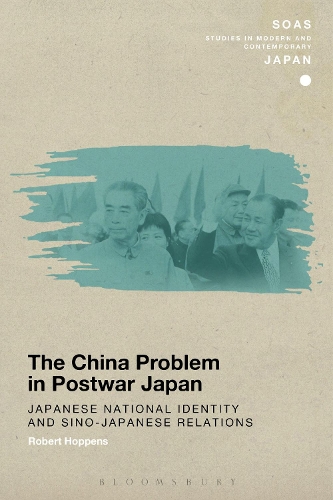
The China Problem in Postwar Japan: Japanese National Identity and Sino-Japanese Relations
(Hardback)
Available Formats
Publishing Details
The China Problem in Postwar Japan: Japanese National Identity and Sino-Japanese Relations
By (Author) Robert Hoppens
Bloomsbury Publishing PLC
Bloomsbury Academic
29th January 2015
United Kingdom
Classifications
Tertiary Education
Non Fiction
International relations
327.52051
Physical Properties
Hardback
312
Width 156mm, Height 234mm
617g
Description
The 1970s were a period of dramatic change in relations between Japan and the Peoples Republic of China (PRC). The two countries established diplomatic relations for the first time, forged close economic ties and reached political agreements that still guide and constrain relations today. This book delivers a history of this foundational period in Sino-Japanese relations. It presents an up-to-date diplomatic history of the relationship but also goes beyond this to argue that Japans relations with China must be understood in the context of a larger China problem that was inseparable from a domestic contest to define Japanese national identity. The China Problem in Postwar Japan challenges some common assertions or assumptions about the role of Japanese national identity in postwar Sino-Japanese relations, showing how the history of Japanese relations with China in the 1970s is shaped by the strength of Japanese national identity, not its weakness.
Reviews
This review cannot do justice to the author's wide-ranging analysis of the nationalist discourse by many Japanese intellectuals and political leaders and its linkage to Japan's China policy ... This book is a major contribution to the study of post-war Japan-China relations ... Written and structured well, it will assist students as well as researchers to better understand the tortuous development of this important bilateral relationship. -- Reinhard Drifte * The China Quarterly *
Hoppens' argument is backed by a solid base of Japanese, Chinese and English-language primary and secondary sources ... Hoppens is to be applauded for not merely relying on the "official" sources ... [as] in moving beyond just the "official" position, readers get a much more rich, nuanced analysis of how the Japanese general public viewed China in the 1970s ... [This book] will be the standard to which those interested in this period of Sino-Japanese relations first turn for the foreseeable future. * Journal of Contemporary Asia *
Richly detailed, the book is by far the most comprehensive English-language diplomatic history of this pivotal period in Sino-Japanese relations and the transformation of Japans post-war national identity. * Japanese Studies *
The book will be of great interest to anyone concerned with Sino-Japanese relations. * Monumenta Nipponica *
Very well researched ... A lucid and reasoned approach to important issues ... A very welcome addition to the large literature on Japanese "identity" and Japan's political discourse. * Radke Sungkyun Journal of East Asian Studies *
How China and Japan have regarded one another since 1945 has led to the expenditure of much ink, but the search for the right words to make sense of it all remains incomplete. As arguably the most important bilateral tie in East Asiabetween the worlds second and third largest economies, and two mighty militariesan explanation is as desirable as it is necessary. Hoppens goes a long way toward that end with this book, especially in assessing the decade of the 1970s and addressing the ramifications of cataclysmic defeat on Japans postwar national identity. He takes beyond Sino-Japanese diplomatic normalization, even touching on the debates over history that occupied many a mind in the early 1980s. For those interested or concerned with the China-Japan relationship, this book deserves our cogitation. * Joshua A. Fogel, Canada Research Chair and Editor, Sino-Japanese Studies, York University, Canada *
The China Problem in Postwar Japan is a fresh and ambitious new look at the complexities of the relationship that postwar Japan has pursued with its giant neighbor, China. Linked by geographic proximity as well as a shared history, Japans leaders have always faced the challenge of adroitly maneuvering a foreign policy with China that would maximize Japans national interests while also balancing domestic concerns (trade and national security) and its alliance with the United States. Utilizing a trove of archival material from Japan, China, and the US, Hoppens does a fine job of illuminating both the success and failures of Japans quest in dealing with this so-called China problem. This is a must read for not only those interested in postwar Sino-Japanese relations, but also for policy-makers who need to garner further insight into what kind of future awaits East Asia with a bolder and more confident China and a wary Japan that is increasingly leaning towards a more proactive security policy. * Tosh Minohara, Professor of Japanese Diplomacy, Kobe University, Japan *
An excellent book ... We strongly recommend that you keep this book in the libraries of major universities. * Nihon Kenkyu *
Author Bio
Robert Hoppens is Assistant Professor in the Department of History & Philosophy at the University of Texas Pan-American, USA.
